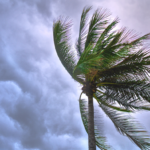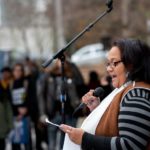 So, I am asked among my friends what climate change means to me. In most communities, it isn’t the fact that people don’t care about it, it is the fact that they have other obstacles to overcome, such as making enough money so ends meet, putting food on the table, assuring the electricity stays on, and they have roofs over their heads. Some organizations, which shall remain nameless, are operated by people who can afford to attend these events, take off from work to attend meetings, workshops and conferences.
So, I am asked among my friends what climate change means to me. In most communities, it isn’t the fact that people don’t care about it, it is the fact that they have other obstacles to overcome, such as making enough money so ends meet, putting food on the table, assuring the electricity stays on, and they have roofs over their heads. Some organizations, which shall remain nameless, are operated by people who can afford to attend these events, take off from work to attend meetings, workshops and conferences.
However to the working people, they are so exhausted that by the time they think about making a difference, there is usually some emergency they have to cover; a sick family member, an appliance breaks, something that requires more income which prevents them from taking time off. There are countless things that, as marginalized communities, we can do, and I am not talking about the red, black and brown ones, I am talking about all marginalized communities, including the white community. Whether you think you are not lumped in with the rest of us, you are. The “elites” look at poor white communities the same as our communities, we don’t matter to them, and until the 99 percent realize that, we will never get anywhere with the issue of climate change.
Climate change is a long-term change in weather patterns caused by greenhouse emissions. That was the definition I heard at a conference in Washington, DC. It wasn’t until I was let go as a contractor, that I was able to be active in climate advocacy. However, that meant for me, living in the south, that I would have to rely on my art skills to help supplement my family income. I recently started planning for climate change, not because the climate is changing but because the climate is changing at a faster rate than ever before. The cost of fuel, food, goods, etc. is so high, I have to grow my own food, and what I don’t grow, I have to purchase. If I am not looking out for the survival of my family, I know we won’t exist in the future. Climate change has begun, and adaptation needs to be vigorous; It is no longer possible to do nothing about it.
I was recently at a NC Climate Change Interagency Council in January 2020. One of the scientists stated, “If current warming trends continue, by 2080, North Carolina will likely feel like the Florida Panhandle, or possibly like northern Mexico within a generation.” The State Climate Office predicts as of 2020, temperatures will increase 4 to10 degrees Fahrenheit by the end of the century. That is a scary thought. What does that mean for me as an indigenous seed protector and farmer? What does that look like for my children, grandchildren and great grandchildren?
Going back three hundred years, the people of North Carolina have been influenced by nontraditional ways of life, resulting in traditional practices being lost. Eighty out of one hundred counties in NC are considered rural. These community members fish in the ponds, streams, rivers, and hunt on lands that have been affected by industrial plants operating upstream for many decades. Today, we buy food from grocery stores and it is not organic. Many fruits and vegetables have been grown using pesticides; it’s not a good outlook for our community.
Being from rural North Carolina, I look at climate change from an American Indian perspective. Everyday community members are beginning to identify potential climate change impacts on their cultural and environmental resources, which is a wakeup call, and it is of the utmost importance. Nowadays, some of my friends are trying to move back to a traditional cultural mindset with local knowledge of recent climate change. Rising temperatures will increase occurrences of heat-related illness and death. Intense precipitation and flooding may result in stress and mental health impacts, reduced ability to provide public health and medical services, increased respiratory diseases such as asthma, and more gastrointestinal diseases. The list goes on.
So, what does that mean for you?
Here are suggestions I share with my children, ones you can start with. Once you start with these, your next step is to tackle the race equity issue surrounding climate change.
- Help by planting a tree, and/or growing your own vegetables and fruit.
- Unplug! Any electronic gadget you can turn on with a remote (TV, DVD player, Nintendo, Xbox) uses power even when “off.”
- Recycle everything you can.
- Shop thrift stores.
- Drink tap water—filtered, if you like—instead of bottled water.
- Use fewer containers.
- Use reusable grocery bags.
The small steps we can make in our lives will extend it here on earth.
 Crystal “Red Bear” Cavalier-Keck is an indigenous water protector and climate change advocate. She is the co-founder of 7 Directions of Service, and a citizen of the Occaneechi Band of Saponi Nation in Alamance County, NC.
Crystal “Red Bear” Cavalier-Keck is an indigenous water protector and climate change advocate. She is the co-founder of 7 Directions of Service, and a citizen of the Occaneechi Band of Saponi Nation in Alamance County, NC.

There are no comments
Add yours